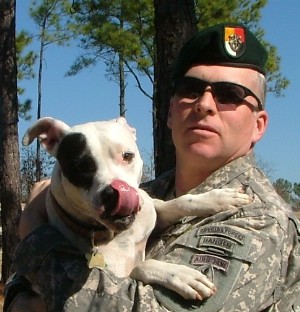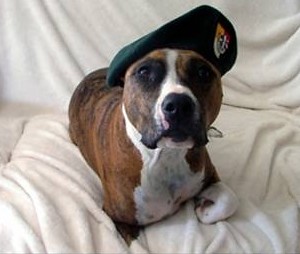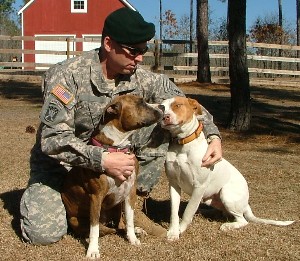 How the “pit bull” is now discriminated against by the United States military
How the “pit bull” is now discriminated against by the United States militaryBy Lynn Ready, Best Friends Network Volunteer
During World War I, they were the all-American dogs pictured on posters as a symbol of our country. In the Civil War era, they were known as nurse dogs, because they were so good with children. Once recognized as a representation of courage in the United States military, American pit bull terriers like Stubby and numerous others, have won medals such as the Silver Star and Purple Heart.
Such history seems to have now been forgotten, as the government is now implementing breed discrimination at many military bases throughout the country, focusing on what they term as “aggressive or potentially aggressive breeds of dogs,” including “pit bulls (American Staffordshire bull terriers or English Staffordshire bull terriers), Rottweilers, Doberman pinschers, chows, and wolf hybrids.”
 The Pentagon submitted a memorandum on January 5, 2009, stating that the above listed breeds may not be kept on any military based housing in the Army. The Air Force has also enacted a breed discriminatory policy and the Navy is next. While policy, this knee-jerk reaction is similar to BDL (Breed Discriminatory Legislation), which targets the wrong end of the leash. Instead, the military should be looking at reckless owners, not a particular breed of dog.
The Pentagon submitted a memorandum on January 5, 2009, stating that the above listed breeds may not be kept on any military based housing in the Army. The Air Force has also enacted a breed discriminatory policy and the Navy is next. While policy, this knee-jerk reaction is similar to BDL (Breed Discriminatory Legislation), which targets the wrong end of the leash. Instead, the military should be looking at reckless owners, not a particular breed of dog.For those who already own one of the banned breeds, they are “grandfathered” in, but on military bases such as Fort Hood, TX, Fort Bragg, NC, and Fort Benning, GA, soldiers and families are banned from owning certain breeds of dogs. Even grandfathering in a dog that is already in base housing does not necessarily provide safe haven, because soldiers typically move every two or three years and will not be able to take their dog to their next installation. Then where does the dog go? Abandoned? To a local shelter where there is already serious overpopulation?
Sergeant’s Dog Seized from Denver, a City With BDL
Heidi Tufto, animal advocate and Staff Sergeant in the United States Army for eleven years, knows this story all too well. Her American pit bull terrier, Lumpy, was taken from her. As so many soldiers are, Heidi was transferred and moved to Denver. Little did she know that one of her three dogs was not welcome in the city.
After living in Denver for only three days, Lumpy was seized from Riverfront Park, where Heidi was walking him, and taken to the local animal shelter and held. A witness, an elderly immigrant from Germany, said it was like the Gestapo with two men dragging Lumpy into their van and allowing her other dogs to get loose to roam the streets, while Heidi was held at gun-point.
Eventually after paying steep fines, appearing in court, and going through a painful experience, she was able to get a friend who lived outside the city to save Lumpy. The dog then stayed with Heidi’s mom until her lease ended so that she could leave Denver and be reunited with her Certified Therapy Dog, Lumpy.
All Heidi kept thinking through the entire painful ordeal was that she was serving her country, having been deployed to Iraq, Kuwait, Asia, Turkey, and Israel - yet this was how they repaid her. Heidi continues to fight Breed Discriminatory Legislation (BDL), and when she retires from the Army, will volunteer at a low-cost/free spay/neuter programs for pets.
Leaving Military Families Distraught
Lynn Lynde, a volunteer with Pit Bull Rescue Central, is very familiar with the ban on military bases, as her husband is a sixteen year, highly decorated war veteran, currently serving in the U.S. Army. They are the proud owners of three American pit bull terriers. Soldiers contact Lynn daily, appalled that they cannot bring along their best friend, sometimes the only thing they have left. She also knows of soldiers who are getting out of the military, due to the ruling. “They are completely mortified that their country wants to repay them for their sacrifices by killing their dogs.”
She also points out the already high incidents of divorce rates in military families as well as the epidemic of soldier suicides. In many cases, their dog is their only remaining companion. Think of the children. These are kids who have a parent or both parents in harm’s way on a daily basis, have to move to a new town, go to a new school and make new friends every few years and the one constant has been the family dog. Now someone tells the child that the dog can not move with them because it is deemed “dangerous.”
 Many of the dogs who are traditional assistance dogs, aiding those with physical handicaps when soldiers return from war, are American pit bull terriers. In fact, the Canines for Combat Wounded organization specializes in placing pit bull therapy dogs with returning soldiers suffering from post traumatic stress disorder. So how is it that we can use these dogs for therapy and healing for the soldiers, but not even allow one as a pet?
Many of the dogs who are traditional assistance dogs, aiding those with physical handicaps when soldiers return from war, are American pit bull terriers. In fact, the Canines for Combat Wounded organization specializes in placing pit bull therapy dogs with returning soldiers suffering from post traumatic stress disorder. So how is it that we can use these dogs for therapy and healing for the soldiers, but not even allow one as a pet?Lynn added, “Soldiers go to war not only to protect the United States, but also to free people from oppression throughout the world. They encounter people gravely suffering due to discrimination based on race, creed, or religion, and yet their own leaders have condemned their best friends on the same short sighted and erroneous belief system.”
Lynn and her husband have decided that, although unlikely, if he were to ever be transferred to a base with a breed discriminatory policy, she would stay behind with their dogs. To them, it’s the only choice. Lynde states, "He has sworn to protect this country and I have sworn to protect our family. Our dogs are our family and I would move to the ends of the earth to protect them so that he can stay focused while defending our nation."
When speaking of her husband’s six deployments, she notes how her pit bulls have centered her. “Sure, other dogs can provide companionship, but pit bulls are so loyal and so goofy that they never allow me to sulk and get depressed. Throughout my husband’s deployments I have felt fear, anxiety, and insurmountable sorrow at the loss of many of our friends, but because of my pit bull companions, I have not once felt lonely.”
Holding Owners Responsible Would be More Effective
Just as there are responsible dog owners and reckless ones everywhere, military bases are no exception. Sadly, there are those who will dump their dog at times of deployment and others who are breeding uncontrollably. Enforcing spay/neuter laws and mandatory micro-chipping are two ways that can help prevent the problem. Officials and veterinarians at Fort Bragg noted that there was at one time mandatory spay/neuter laws, as well as laws against breeding on military bases, but apparently these laws were never enforced.
Holding owners responsible would be much more effective than incorporating breed discrimination, which has never been proven to be effective anywhere.
Government Stamp of Approval?
If you think just because you don’t live on a military base, that this does not affect you, think again. This can easily be interpreted as the federal government putting their stamp of approval that some breeds are dangerous dogs. Cities surrounding these bases may start to pass BDL based on this idea. Once one city passes it, the city next to it might do the same, and so on. BDL has affected many cities and even entire states throughout the United States. The ramifications are horrendous, and now it is affecting the men and women who are protecting us.
The Cause is Unclear
Where did it come from? How did it all start? Was it the government? Speculation leans towards the privatized housing that provides most military base housing. Could it be that the companies who provide the housing is the one causing the whole problem? Is it possible that they associate certain breeds of dogs with irresponsible owners such as the media portrays?
Bill Mulvey, Vice President of Communications at Picerne Military Housing, gave assurances that they are pet-friendly. He also said that Picerne suggested to the Pentagon that they propose a policy that is uniform on every base, since some enforced breed bans on certain dogs while others did not. Sadly, it looks as though that blanket ban is the route they took.
BSL is Not Effective
 Municipalities such as Baltimore, Maryland have deemed BDL as ineffective at lowering risks of dog bites or attacks. A total of over $750,000 was spent in Baltimore in 2001 to enforce the legislation, only to find out that it is not even effective. That money could be spent on more positive ways of enforcing stricter rules against irresponsible dog owners or to offer free or low cost spay/neuter programs. Other things that can be done are to allow permanently anchored fencing, enforce laws against breeding on military bases, and mandatory micro-chipping.
Municipalities such as Baltimore, Maryland have deemed BDL as ineffective at lowering risks of dog bites or attacks. A total of over $750,000 was spent in Baltimore in 2001 to enforce the legislation, only to find out that it is not even effective. That money could be spent on more positive ways of enforcing stricter rules against irresponsible dog owners or to offer free or low cost spay/neuter programs. Other things that can be done are to allow permanently anchored fencing, enforce laws against breeding on military bases, and mandatory micro-chipping.Even studies of pre and post breed bans in the United Kingdom and Spain have concluded that prohibiting “pit bulls” did not reduce the number of dog bites occurring.
The slogan of the Green Berets, special operations unit in the military, is "De Oppresso Libre" which means "Free the Oppressed" and their mascot is the American pit bull terrier. Another way to think about it; if Theodore Roosevelt and General Patton were alive today, they would not be allowed to have their dogs on a military base.
Lynde says, "My biggest complaint about being a military wife, who owns pit bulls, is that when my husband calls from overseas, he often asks about them before he asks about me." She adds, “It sickens me that while he should be worried about IEDs; instead he's worried that some official in the U.S. is going to ban his dogs."
WHAT YOU CAN DO:
► Write a letter to President Barack and Michelle Obama, as well as Army officials. You may contact the President and the First Lady here or send an e-mail to comments@whitehouse.gov and put the appropriate name in the subject line. To comment to the Army, contact Ms. Joyce VanSlyke at joyce.vanslyke@us.army.mil.
Please keep your contact polite, professional and educational. Encourage other alternatives such as:
• Consider mandatory micro-chipping. Fine those who abandon their dogs.
• Encourage a law prohibiting dogs from being alone in a yard without supervision, until permanently anchored fencing is allowed on military based housing.
• Enforce mandatory spay/neuter programs for all pets on military based housing.
• Enact higher fines for those who breed dogs on military bases.
• You can also join the Stop Breed Specific Legislation community on the Best Friends Network.
• Teach the community, particularly children, about responsible dog ownership and care. Offer humane educators to speak.
For more information:
• Memorandum on Pet Policy for Privatized Housing Under the Army’s Residential Communities Initiative
Photo credit: provided courtesy of Lynn Lynde



2 comments:
I think the military should be ashamed of themselves for this banning this breed and forcing the men and women in the service who are risking there lives for there country to be told they can't keep there pet. The pitbull being used as a symbol in world war one was good enough then. Not all pitbulls are bad dogs depending on they way they are bred,raised and treated instead of going after these poor dogs who have a bad reputation because of other people braking the law shouldn't be punished lets not punish the breed lets SHUT DOWN ALL DOG FIGHTING RINGS AND GIVE HARSHER PUNISMENT TO THOSE RUNNING THESE ILLEGAL DOG FIGHTS
Dogs on Deployment, a military pet support organization, is leading a push to Standardize Military Pet Policies. Please visit our website to learn how you can help. www.dogsondeployment.org and click Take Action!
Post a Comment